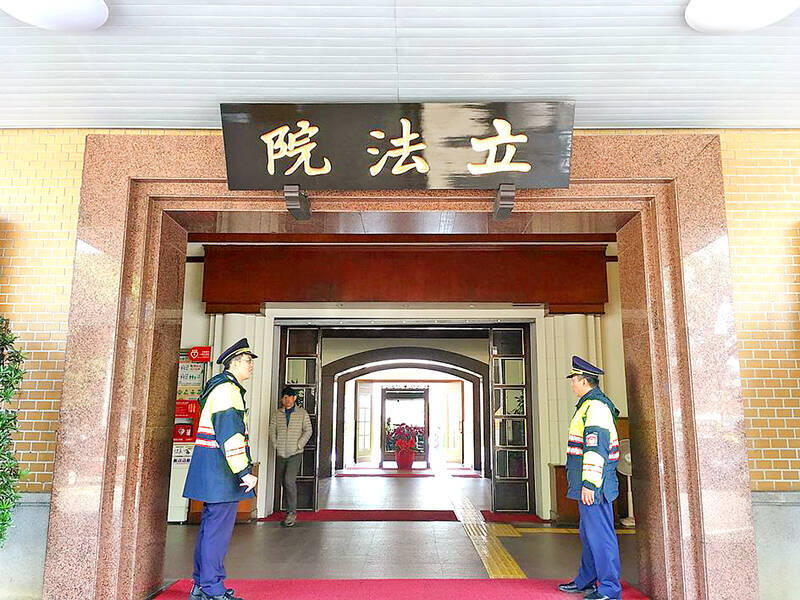Democratic Progressive Party (DPP) lawmakers have proposed an amendment to more clearly define which actions count as “undermining the nation’s national security,” aiming to penalize retired military officers who support Chinese propaganda activities.
DPP legislators Wang Ting-yu (王定宇), Michelle Lin (林楚茵) and others proposed to amend Article 9-3 of the Act Governing Relations Between the People of the Taiwan Area and the Mainland Area (臺灣地區與大陸地區人民關係條例).
The act stipulates that no person who previously served as deputy minister, major general, chief officer or higher rank in government agencies related to national security shall participate in any activity held by organizations in China which in turn harms national dignity.

Photo: Lin Liang-sheng, Taipei Times
Activities that harm national dignity are defined as “saluting the flag or emblems, singing anthems or any other similar behavior that symbolize the political authority of the Mainland Area.”
The proposed amendment replaces “other similar behavior” with “actions aligned with political propaganda that support China’s ‘united front’ tactics,” due to the former statement’s ambiguity, legislators said.
Some retired military officers have justified China’s military actions around Taiwan and sympathized with Chinese propaganda in interviews with China’s state media, posing a national security risk, the legislators added.
If the amendment is passed, penalties could be imposed on retired officials or military officers who cooperate with China’s “united front” propaganda efforts, they said.
Some military personnel have made remarks in support of the Chinese People’s Liberation Army, cooperated with Chinese propaganda or advocated for Beijing’s political agenda in Taiwan, Wang said yesterday.
That behavior is difficult to penalize, but the public strongly dislikes it, especially when it comes from retired military officers who are receiving pensions funded by taxpayers, Wang added.
Whether retired military officers’ cooperation with Chinese propaganda is illegal would be determined by prosecutors, but loopholes in national security laws must be addressed first, he said.

Chinese Nationalist Party (KMT) Chairman Eric Chu (朱立倫), spokeswoman Yang Chih-yu (楊智伃) and Legislator Hsieh Lung-chieh (謝龍介) would be summoned by police for questioning for leading an illegal assembly on Thursday evening last week, Minister of the Interior Liu Shyh-fang (劉世芳) said today. The three KMT officials led an assembly outside the Taipei City Prosecutors’ Office, a restricted area where public assembly is not allowed, protesting the questioning of several KMT staff and searches of KMT headquarters and offices in a recall petition forgery case. Chu, Yang and Hsieh are all suspected of contravening the Assembly and Parade Act (集會遊行法) by holding

PRAISE: Japanese visitor Takashi Kubota said the Taiwanese temple architecture images showcased in the AI Art Gallery were the most impressive displays he saw Taiwan does not have an official pavilion at the World Expo in Osaka, Japan, because of its diplomatic predicament, but the government-backed Tech World pavilion is drawing interest with its unique recreations of works by Taiwanese artists. The pavilion features an artificial intelligence (AI)-based art gallery showcasing works of famous Taiwanese artists from the Japanese colonial period using innovative technologies. Among its main simulated displays are Eastern gouache paintings by Chen Chin (陳進), Lin Yu-shan (林玉山) and Kuo Hsueh-hu (郭雪湖), who were the three young Taiwanese painters selected for the East Asian Painting exhibition in 1927. Gouache is a water-based

Taiwan would welcome the return of Honduras as a diplomatic ally if its next president decides to make such a move, Minister of Foreign Affairs Lin Chia-lung (林佳龍) said yesterday. “Of course, we would welcome Honduras if they want to restore diplomatic ties with Taiwan after their elections,” Lin said at a meeting of the legislature’s Foreign Affairs and National Defense Committee, when asked to comment on statements made by two of the three Honduran presidential candidates during the presidential campaign in the Central American country. Taiwan is paying close attention to the region as a whole in the wake of a

OFF-TARGET: More than 30,000 participants were expected to take part in the Games next month, but only 6,550 foreign and 19,400 Taiwanese athletes have registered Taipei city councilors yesterday blasted the organizers of next month’s World Masters Games over sudden timetable and venue changes, which they said have caused thousands of participants to back out of the international sporting event, among other organizational issues. They also cited visa delays and political interference by China as reasons many foreign athletes are requesting refunds for the event, to be held from May 17 to 30. Jointly organized by the Taipei and New Taipei City governments, the games have been rocked by numerous controversies since preparations began in 2020. Taipei City Councilor Lin Yen-feng (林延鳳) said yesterday that new measures by